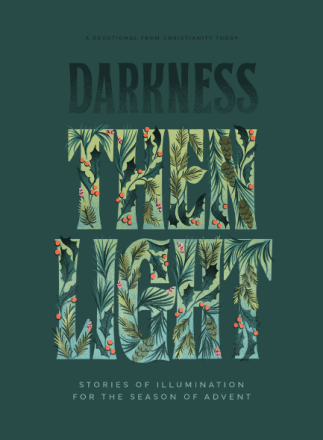I was watching my son come out of the water at the beach. He was laughing until he wasn’t. He couldn’t see me. I watched him scan the sand for my chair.
“Mom!” he shouted while starting to panic. He thought he was lost because he couldn’t see me. But he wasn’t lost at all. He had stopped watching me, but I never stopped watching him.
I have gone through dark spaces in my life. Gaps where I couldn’t see how the dots would connect where I was with where I hoped to be going. I have shouted at the ceiling. I have prayed into the darkness. I have cried out to a God that I couldn’t see anymore. These gaps are what I call “dark spaces.” They’re the spaces between what we see and what we can’t. Between faith and fear. Uncertainty and urgency. Hope and hallucinations.
Dark spaces are inevitable. The word darkness is used around 150 times in the Bible. On earth there will be darkness. But there will also be light. Much of life is spent navigating the gap in between. It’s a theme of Scripture—the ongoing battle between darkness and light. None of us will escape it.
I want my obedience to God to come with a detailed prophecy of how these stars align. I want a visible string. Thread the needle and show me the yarn. But so rarely does what I want match what I have experienced. And we don’t talk about the dark spaces enough.
The dark space between “I surrender all” and “once I see how it turns out.” Between singleness and the altar. Between the womb and the baby. Between the diagnosis and the healing. Between the last two weeks’ pay and the new-hire form. Between the moving and the landing.
The hardest part of faith is standing ten toes deep in the gaps of these dark spaces. It feels like quicksand, like your knees will disappear while praying on them. Yet Scripture is filled with dark spaces. And very few of our heroes managed them well. Job nearly died in his descent into the dark space. Sarah laughed in hers. Hannah wept in the bitterness of it. And Jonah ran from his.
Jesus was born to secure the gap between Eden and our eternity in heaven. There will be no more waiting then. No more quicksand. No more “Where is God?” or “I can’t see you.” God came to earth to stand ten toes deep with us in the dark spaces.
“I thought I’d see you by now,” I cried out to God in my bedroom one evening. And that’s when I remembered the beach. My son thought he had been lost. But he wasn’t lost at all. He had stopped watching me, but I never stopped watching him.
So it is with God every time we step into the darkness. There is a Light that sees you, even when you can’t see it.
Heather Thompson Day is the author of What If I’m Wrong? and host of the What If I’m Wrong? podcast.










